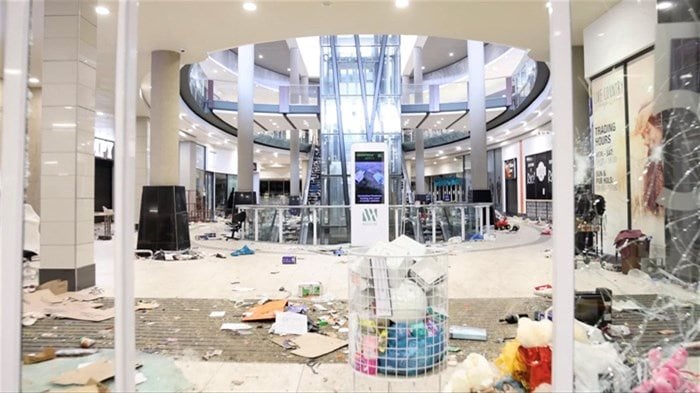The shadow of the July 2021 civil unrest in South Africa will impact the economy and business confidence for some time to come, what of the healing that needs to take place and societal interventions at a grassroots level to ensure it never happens again?

A view shows damage inside a shopping mall following protests that have widened into looting, in Durban, South Africa 13 July 2021, in this screengrab taken from a video. Source: Kierran Allen/Reuters
Activate! Change Drivers, in collaboration with the Democracy Development Programme, recently hosted a webinar to discuss the issue of ‘Rebuilding after the unrest - what are our options?’.
On the panel were Bonolo Makgale, University of Pretoria Centre for Human Rights, Kimera Chetty, a consultant with risk assessment firm for Africa Practice and columnist Andile Zulu.
The purpose of the webinar was to evaluate the nature of the July 2021 social unrest, what it revealed and the role of South Africa’s leadership.
Unrest was “avoidable”
Chetty said the unrent that led to a state of disaster being declared in KwaZulu-Natal could have been avoided. She added that the warning signs were there in the fractious party politics, municipal failures and rising social tensions amidst the Covid-19 pandemic.
Chetty warned that the speed at which the unrest spread exposed South Africa’s vulnerabilities in the extreme fragmentation of the political sphere and government.
“Unless we take ownership of how we want to be represented by those with the mandate to do so, this episode is likely to recur,” she said.
During the webinar, Chetty outlined Africa Practice’s key societal interventions the South African government should consider to address the country’s socio-economic issues and prevent social unrest from reoccurring in the future:
1. Guarantee policy certainty
Chetty said the government must be transparent, consultative and support policy positions that drive investment by allowing for a conducive and enabling environment to do business.
2. Prioritise the economy
Chetty urged the government to invest in building the capacity of South Africa’s youth, digital innovation and partnering with industry to create jobs and skills. “Access to the market is only meaningful if people can realistically compete for opportunity,” she said.
3. Heal society
The system of Apartheid may have been formally dismantled but spatial and economic exclusion remain a reality. Chetty said true reconciliation will be “messy, uncomfortable and hard”, but in so far as race, class and gender are still determinative of social progress, it is a road worth travelling”.
4. Clean up house
“The safety net of liberation rhetoric to secure votes is coming apart at the seams. The corruption of the country’s security cluster means the country can be held to ransom to political insurrection. The ANC’s majoritarian grip, buttressed by weak and fragmented opposition, has cemented internal complacency,” Chetty said.
5. Rebuild
“South Africa does not need more resilience tests. The massacre at Marikana, the tragedy of Life Esidimeni and the failure of the social grants payment system are but a number of avoidable scandals destined for repetition unless we rebuild meaningfully,” Chetty said.
She added that the government needs to commit to the realisation of a basic income grant, address local government failure and be inclusive when determining South Africa’s development agenda.
Shawn Govender 30 Aug 2021 Involve all stakeholders in policy-making processes
Makgale added that policy-making processes should be open to civil society organisations, businesses and communities most affected by poverty and unrest.
“Meaningful rebuilding is a collaborative effort and there is a space for all stakeholders to be involved in this process. The State should be at the forefront of these efforts. “The causes of unrest in South Africa are typically structural in nature and therefore on the fault lines of inequality, based on class, race and other factors.
“A structural approach would be best as we consider ways to remedy what is happening in our communities - ways in which to reimagine our democracy. We need creative ways to reformulate a new South Africa,” Makgale concluded.










































